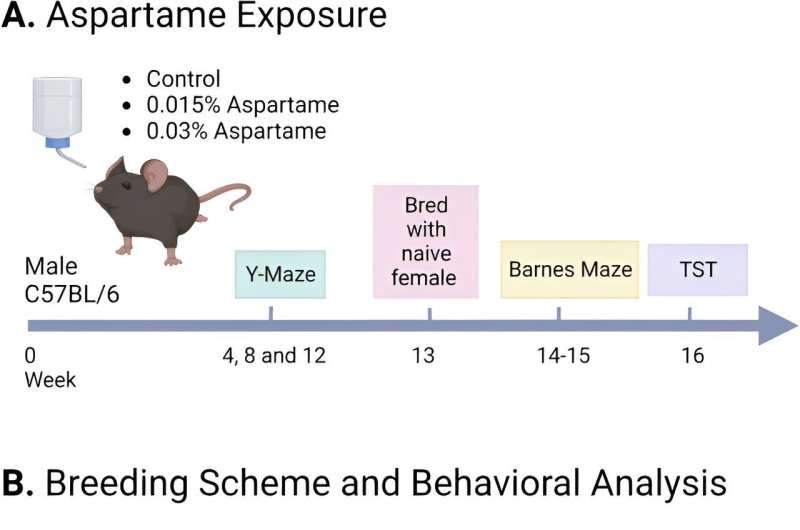This article has been reviewed according to Science X's editorial process and policies. Editors have highlighted the following attributes while ensuring the content's credibility:
fact-checked
peer-reviewed publication
trusted source
proofread
Researchers discover learning and memory deficits after ingestion of aspartame

Ongoing work by Florida State University College of Medicine researchers into how aspartame affects the brain has linked the artificial sweetener with learning and memory deficits in mice.
The offspring of male mice that consumed aspartame at levels equivalent to much lower doses than those deemed safe by the U.S. Food and Drug Administration (FDA), demonstrated spatial learning and memory deficits over the course of a controlled 16-week exposure. The study is published in Scientific Reports.
And while recent World Health Organization guidelines point out potential associations between the consumption of aspartame and other artificial sweeteners and increased risk for metabolic disease, cardiovascular disease and cancer, they did not address potential effects on cognitive abilities.
"This is a cognitive function that is distinct from the anxiety behavior, so the effects of aspartame are much more widespread than the previous paper had suggested," said co-author Pradeep Bhide, the Jim and Betty Ann Rodgers Eminent Scholar Chair of Developmental Neuroscience in the Department of Biomedical Sciences.
The most recent research is an extension of the work the Bhide Lab produced in a study published in the Proceedings of the National Academy of Sciences in December 2022, which linked aspartame consumption to anxiety in mice, with effects extending up to two generations.
"There is some overlap in terms of learning, memory and anxiety, in the sense that often there is an emotional component to our learning," Bhide said. "When there's an emotional impact, you remember better. But this is a quite distinct function and brain network.
"The second thing we noticed here, unlike the anxiety (research), this went only one generation. It was not seen in the grandchildren, only in the children [of the male mice], which is another line of support that these kinds of transmissions occur due to epigenetic changes in the sperm."
Over the course of 16 weeks, the mouse models were separated into three groups: a control group that consumed only water, a group that ingested 7% of the FDA's recommended maximum intake of aspartame—equivalent to two 8-ounce diet sodas daily—in its water, and a group that ingested 15% aspartame (four 8-ounce diet sodas daily) in its water.
These are the same levels of aspartame exposure the Bhide Lab used in its anxiety research.
All of the mouse models were tested at four-, eight- and 12-week intervals in a Y-maze, and again at 12 weeks in a Barnes maze. In the latter, the mice learn to find a "safe" escape box out of 40 possible choices arranged in a circular arena.
The mice in the aspartame-free control group found the "safe" box quickly. Those that ingested aspartame took much longer to learn the task.
"We're seeing they use a different strategy, but they do find the escape box," said co-author Deirdre McCarthy, research faculty in the Department of Biomedical Sciences and the Center for Brain Repair. "They compensate in some sort of way."
The compensation to overcome learning and memory deficits is significant, according to Bhide.
"Again, they can function, but they need longer time, or may need extra help," he said, suggesting that the FDA takes a closer, multi-generational perspective on the effects of aspartame."
Additional co-authors of the published research include Biomedical Sciences researcher Sara Jones, Associate Professor Gregg Stanwood and FSU Department of Psychology Professor Christopher Schatschneider.
More information: Sara K. Jones et al, Learning and memory deficits produced by aspartame are heritable via the paternal lineage, Scientific Reports (2023). DOI: 10.1038/s41598-023-41213-2




















